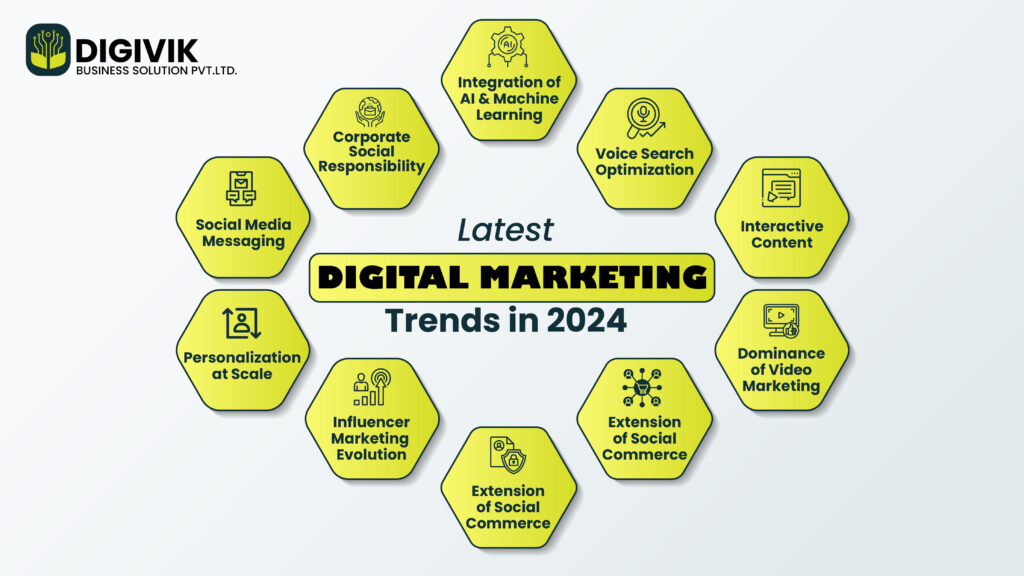
Digital marketing trends change due to swiftly changing consumer behavior and the external environment. According to the research conducted by the OECD, consumers will still be cost-conscious. Also, most people are likely to seek out particular brands that show they are doing something for the good of society and not just for their bottom line. There’s a lot to do to succeed in business in 2024, but if they know what trends are coming down the line, it’s easier to plan, strategize, and get ahead of the competition in the market. So, if time travel were possible, then every marketer or business would fast-forward to the new year to find clues on what’s next in digital marketing.
Digital marketing trends or strategies are continually evolving. Before a new or digital marketing trend is on its way, each business must be aware of every latest digital marketing trend to sustain itself over rivals in the market. 2024 is going to witness an uninterrupted, fast development in digital marketing due to changes in customer behavior and technological advancements. These developments show how important it is to keep up flexibility or react to the evolving digital environment to be successful in 2024 as well as after that. There are some recent developments affecting the digital marketing environment, discussed below:
Digital Marketing Trends
Integration of AI and Machine Learning: Digital marketing trends or strategies are now beginning to incorporate AI and machine learning more and more frequently. AI is completely transforming how marketers interact with and understand their target audience, from customized recommendations for content to predictive data analysis for more efficient marketing.
Voice Search Optimization: With the increasing popularity of speech-activated devices like virtual assistants as well as smart speakers, websites need to optimize content for voice search, considering various factors. That’s why marketers must focus on long-tail phrases and conversational keywords more accurately to figure out how users behave with voice search queries.
Interactive content: Users are getting more attracted and engaged by interactive content like polls, quizzes, and virtual-reality experiences and are paying more attention to this interactive content. These interactive formats have been implemented by brands to engage with target audiences and develop connections with them.
Dominance of Video Marketing: Digital marketing channels, including various social media platforms, continue to be dominated by video advertisements. Brands can interact more effectively with customers and successfully communicate their perceptions through interactive video advertisements, short-form films, and live streaming.
Extension of Social Commerce: E-commerce functions are currently being progressively incorporated into social networking platforms, allowing users to find and buy things without having to leave the app. Companies are making use of features of social commerce to speed up the process of purchasing and make money from purchases made impulsively.
Privacy and Data Protection: With technological advancements, concerns about data privacy have increased. Marketers have begun to concentrate on maintaining transparency, and for this, they try to follow regulations like GDPR. So, a company is required to implement secure and trustworthy data management procedures that promote trust among consumers.
Influencer Marketing Evolution: Influencer marketing is taking the place of standard long-term collaborations. because influencers promote products and services in particular geographical areas and target audiences in those areas. So, businesses have chances to grow increasingly. That’s why companies prefer to collaborate with them and work according to their principles and authenticity.
Personalization at Scale: Marketers can deliver highly customized products at mass with the help of automation technologies and advanced data analytics. By considering individual preferences, customization improves engagement and enhances conversions on websites through dynamic content and specific product suggestions.
Social Media Messaging: Private communication channels and applications for messaging are gradually gaining advantages as the platforms that are preferred for consumer engagement. Through messaging platforms, brands make use of chatbots and AI-powered assistants to provide real-time assistance along with customized suggestions.
Sustainability and Corporate Social Responsibility (CSR): Business practices that promote sustainability are growing increasingly. Because they are socially aware, customers are reacting positively towards brands that demonstrate a commitment to corporate social responsibility and environmental sustainability, which in turn builds brand loyalty.